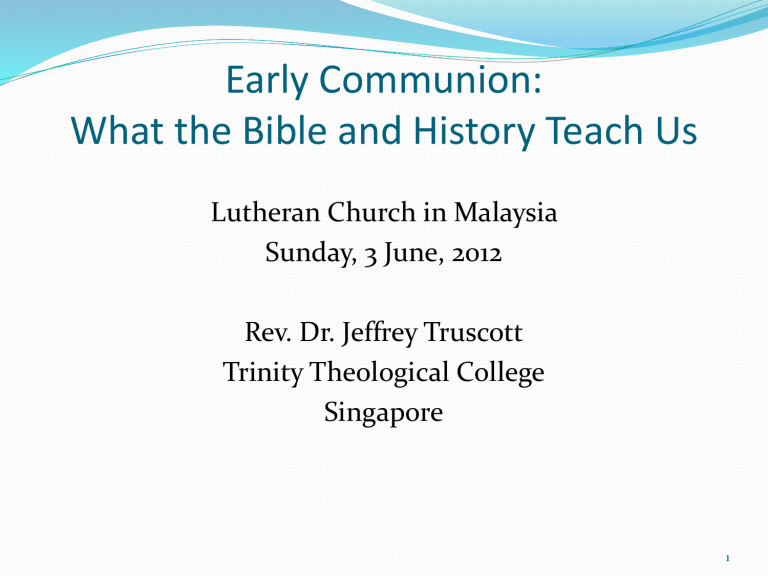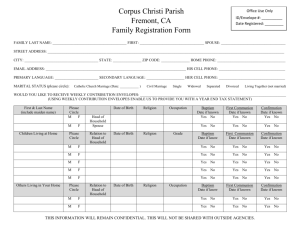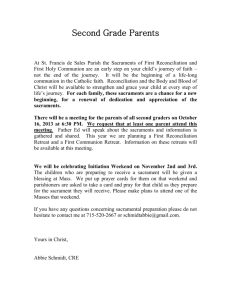Early Communion - Bangsar Lutheran Church

Early Communion:
What the Bible and History Teach Us
Lutheran Church in Malaysia
Sunday, 3 June, 2012
Rev. Dr. Jeffrey Truscott
Trinity Theological College
Singapore
1
What is early communion?
Traditionally, confirmation has been a pre-requisite for receiving Holy Communion in Lutheran churches
“Early Communion” refers to permitting baptized children to begin receiving communion before confirmation
2
What does the OT tell us?
In the Old Testament, the Passover was eaten by entire families
Exodus 12:3 – “each man is to take a lamb for his
family, one for each household”
The sacred meal was for people of all ages
3
What does the NT tell us?
The NT says very little about who may receive Holy
Communion – we can only draw inferences from different accounts
Matt 14:21 – in addition to 5,000 men, women and
children were among those fed by Jesus
Other accounts do not seem to EXCLUDE children
4
What does the Bible tell us?
The most we can conclude from the NT is that
Baptism/profession of faith is required for participation in the meal (cf Acts 2:38)
The NT does not distinguish between baptized membership and communing membership
5
What does the early church tell us?
The Didache (2 nd cent AD) – explicitly states that only the baptized may receive Holy Communion:
You must not let anyone eat or drink of your Eucharist except those baptized in the Lord’s name.
For in reference to this the Lord said,
“Do not give what is sacred to dogs.” (ch 9)
6
What does the early church tell us?
The Apostolic Tradition (ca 215 AD)– document gives instructions for preparing candidates for baptism, and baptizing
Both adults and “the little ones” (small children) are the presumptive candidates for baptism
The newly baptized receive communion with the congregation; the former also receive a cup of milk honey (ch 21)
We might infer the communion of children from this document
7
What does the early church tell us?
Augustine of Hippo (354-430) gives an extensive theology of infant communion
He rejects the widely held view of infant “innocence” arguing that infants need to be saved (Sermon 174)
Due to their helpless condition, infants are the perfect subjects of the sacraments (en in Ps. 54, 24).
Approaching the sacraments as non-/pre-rational also make them ideal, since the words Jesus uses to describe the eucharist are those of an infant. To eat the sacrament is to become a child again
8
What does the early church tell us?
Augustine would not base participation in the sacraments on either age cognitive ability – for him, age is not the same as Christian maturity
“For you know that all who are baptized, whether they are old or young are called infants” (Trac. In Joh.
XXVI.1, quoted in Holeton, p. 6)
For Augustine the communion of infants is necessary; it is the sacrament of unity that constitutes the church
9
What does the early church tell us?
John the Deacon (ca 500 AD) indicates in a letter that all the rites of initiation (baptism, signing, first communion) “are done even to infants” (par 7)
10
What happens in the middle ages?
The cup of wine ceased to be given to the laity during
Holy Communion, due to fears of spilling Christ’s blood
This mean that infants could no longer participate in communion since they could only receive a little bit of the wine (they could not digest the bread)
11
What happens in the middle ages?
A special rite involving the bishop’s laying on of hands on the baptized was imposed throughout Europe in the 10 th century (“confirmation”)
But Christians had to be encouraged to take their children to be confirmed by a bishop (a sacrament)
Confirmation became a pre-requisite for receiving
Holy Communion
Age 7 was set as the age by which children were to be confirmed
12
What happens in the middle ages?
It was argued that children could not discern the body of Christ before this age and so did not need Holy
Communion
In sum, the church’s attitudes about the age and prerequisites for communion were driven by the need to get children confirmed by a bishop!
In general, Lutherans never saw a need for this special rite by bishops and Luther denied its validity as a sacrament
13
What happens in the middle ages?
Worship historian James F. White (1932-2004) states:
“…it is important for contemporary debates that for nearly twelve centuries, both West and East were agreed that communion was part of initiation.
Infant communion has a long, if forgotten, history throughout Christendom.”
(Brief History of Christian Worship, p. 81)
14
What do Luther and the Lutheran
Confessions tell us?
Luther and the Confessions were primarily concerned that
adults properly understood the Lord’s Supper
When Luther does mention children, he states that they should be admitted to communion because they are
baptized members of the church – not because they have been confirmed or reached a certain age (“ Because they have been baptized and received into the people of Christ, they [children] should also enjoy this fellowship of the sacrament so that they may serve us and be useful.”)— although he does require their instruction
15
ELCA’s Use of the Means of Grace
(1997)
“Baptized children begin to commune on a regular basis at a time determined through mutual conversation that includes the pastor, the child, and the parents or sponsors involved, within the accepted practices of the congregation. Ordinarily this beginning will occur only when children can eat and drink, and can start to respond to the gifts of Christ in the Supper.” (37C)
16
ELCA’s Use of the Means of Grace
(1997)
“Infants and children may be communed for the first time during the service in which they are baptized or they may be brought to the altar during communion to receive a blessing.”(37C)
17
Lutheran Church in Singapore
Baptized children commune after:
Receiving instruction along with their parents
(relationship of sin, forgiveness, and Holy Communion)
Conversation with the pastor to discern child’s readiness for receiving Holy Communion
18
Lutheran Church in Singapore
Did not set an age for first communion—spiritual readiness was recognized as central
Emphasized the role of parents as co-participants in the educational process and as model of participation in the Lord’s Supper
Emphasizes baptism as the rite of admission to communion (no separate FC rite developed)
Adopted idea of confirmation as “equipping young people for responsible church membership and discipleship in daily life” (PS VI)
19
Lutheran Church in Singapore
When is a child ready? A: when a child can recognize him/herself as a sinner and that HC is a special meal in which Jesus comes to offer God’s forgiveness.
What is the role of intellectual understanding? A: admission to HC does not rest entirely on intellect.
20
A Rite for First Communion?
Neither ELCA or LCS currently have any special “rite” for first communion (vows, rituals, etc)
Baptism is properly understood as the “rite of admission” to Holy Communion
The point of first communion is to receive the sacrament, in that case no extra ritual is necessary
Extra rituals obscure both the meaning of baptism and first communion
21
Summary
Documents of the early church make instruction and baptism requirements for communion
Baptism is understood as the rite of admission to communion
Once infants became the primary baptismal candidates, churches did not exclude them from communion (1 Cor 11 was no hindrance!)
Later circumstances led to their exclusion from communion; infant communion had to be suppressed!
22
Summary
ELCA, LCS and other Lutherans churches have moved to early communion
At first, American Lutherans were concerned about avoiding the perception that confirmation/first communion gave full membership status
Now ELCA emphasizes the idea that baptism admits one to the Supper regardless of one’s age
LCS also emphasizes the relationship between baptism and first communion; talks about faith receiving the gifts of HC, rather than constituting basis of admission
23
Summary
ELCA and LCS have
No prescribed age for first communion
No prescribed special “rite” of first communion
24
Summary
The case FOR early communion is based on the long history of communing children in the church and our understanding of baptism
Bible and history also challenge us to give children instruction/preparation not so that they are worthy or qualified, but to help them appreciate the meaning of the sacrament and receive its benefits
25
Final thoughts
“Early communion” will be an important step for children
Makes clear that they are part of the church “family”
They don’t have to earn their place at the Lord’s Table because it is the gift of their baptism
The meaning of baptism begins to come into focus for children
26
Final thoughts
The previous point about the sacraments are important
Lutherans are distinctive in their understanding of the
Sacrament
Sacraments do not convey information about God
Sacraments are where God works to transform us
27
Now what?
It boils down to our understanding of:
God
Ourselves
Sin
Sacrament
Is your child ready?
Education is important
What then about confirmation?
How are we going to do it?
28






